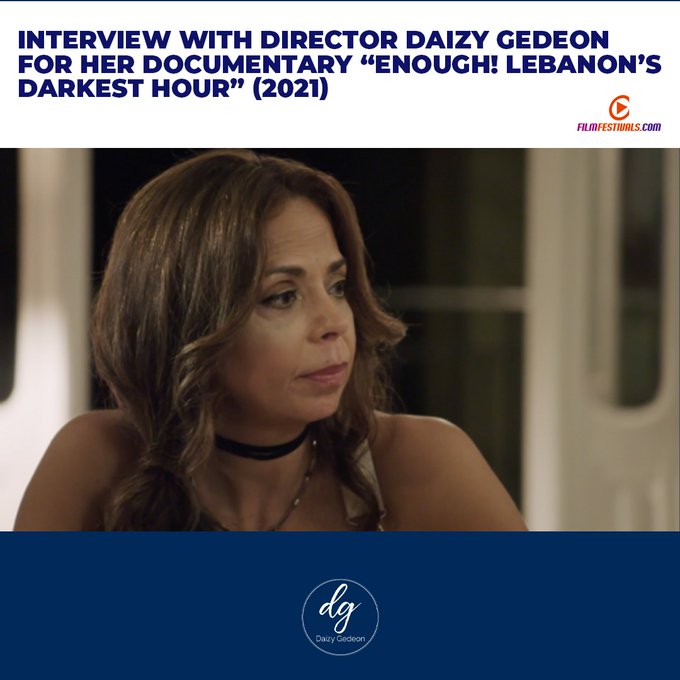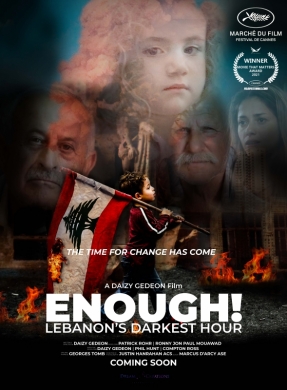
Intrepid humanitarian journalist, filmmaker and entrepreneur Daizy Gedeon has been making international headlines with her latest feature documentary “Enough!: Lebanon’s Darkest Hour” (2021). Born in Lebanon amidst unrest, Daizy's family moved her to Sydney where she grew up. After decades spent on faraway shores, her Lebanese identity and passion for her birth country has only grown stronger with time.
Before her career as an award-winning documentarian, she was a renowned international journalist as the first female sports writer for The Australian newspaper and later its deputy foreign editor. In 1993, she filmed her first documentary, “Lebanon...Imprisoned Splendour”, which featured global star Omar Sharif and was released in 1996. That film went on to win several awards and was in consideration for an Academy Award for best documentary in 1998. She is a force to be reckoned with and will stop at nothing to turn the tide in saving her country's people and legacy.
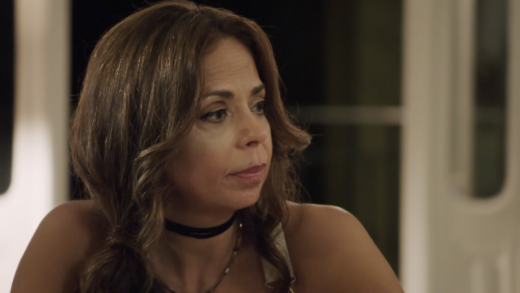
Director Daizy Gedeon.
In an interview with Daizy shortly after the 74th Cannes Film Festival, here is what she had to say:
Your career began as a journalist. Can you tell us about that?
DAIZY: I began my career at the age of 18. Straight out of high school I got a job at News Corp, Rupert Murdoch's, news organization, as a “copy” person as they called us in those days running copy to the newsroom. I was one of ten out of thousands of people that year that was lucky enough to have secured a job which would lead to a cadetship and my journalism career. I was very much into sports back then and believed that was what I wanted to do with my career. During my three to four years of training, I ended up as a journalist on The Australian newspaper writing about sports. Within a year I was offered my own round, which was to cover soccer, or “football” as it's known globally. I became the first female soccer writer in Australia and the first female sportswriter in the history of the Australian newspaper. I remained in that role for the next few years covering the “Socceroos” journey to the Olympic Games in Seoul Korea 1988 which was a tremendous highlight for me.
DAIZY CONT’D: That year I also travelled to Lebanon for the very first time since my family left in 1970. That two-week trip to Lebanon ended up being six weeks which opened my eyes to the world of international politics and wars. Lebanon had been enduring a Civil War since 1975 and its reputation globally had sunk from the glory days in the 50s and 60s as the Paris of the Middle East and the Pearl of the region, to being the haven of terrorists, kidnappers, a meeting place for espionage agents, and the center of all that was rotten and beautiful in the world. That short trip changed my life forever. I returned to Australia and to my newspaper and asked my editor if I could move to the foreign desk to cover foreign affairs and World News because I became obsessed with finding out why this tiny little country was being destroyed and demolished despite having such a rich history and tremendous legacy.
DAIZY CONT’D: I moved to the foreign desk immediately and started immersing myself in the Middle East crisis and learning as much as I could about the Arab Israeli conflict and how that impacted Lebanon. I travelled back and forth to the region for a couple of years and moved to London in 1990 where I worked for The Times newspaper group and Channel 4 News as a TV producer for nearly two years including throughout the first Iraq war in 1991. I was back and forth to Lebanon learning more about the regional issues during that period. In 1992-93 I returned to Australia after being wooed to return and offered the role of deputy foreign editor of The Australian newspaper. In 1993 I returned to Lebanon to film my first documentary, “Lebanon...Imprisoned Splendor”, which featured global star Omar Sharif and was released in 1996. That film went on to win several awards and was in consideration for an Academy Award for best documentary in 1998. I officially stopped working as a journalist in around 2001-2002 after getting married and starting a family.
You escaped Lebanon in the 70s as a child and have lived in Sydney since. Can you tell us about that experience?
DAIZY: My parents left Lebanon in 1970 when I was a child of five. The signs of trouble and war had begun to manifest in the country in the mid ‘60s. The Arab Israeli conflict was spilling over into Lebanon, and it was becoming very apparent that there were troubled times ahead.
When was it that you began returning to Lebanon and decided to devote so much of your career to its legacy?
DAIZY: I began returning to Lebanon in 1988, which was my first trip back since my family left. The reason I decided to devote so much of my career to its legacy was because I needed to understand why it was being used as a battleground by global and regional powers and why some Lebanese were prepared to sell out their country and their countrymen for power and money. It would have been easy not to do this and not to want to fight for Lebanon or understand its predicament, if not for the life changing experience I had in 1988 and on every other trip since. There I experienced the warmth and hospitality of the people; the extraordinary history of the country; the Roman and Phoenician ruins which are such archaeological treasures that I had no idea existed on this tiny piece of earth; the land that Jesus walked and performed miracles on; Byblos the city where the Bible was written by the disciples Peter and Paul; the extraordinarily pretty coastline, mountain ranges, greenery, waterfalls and rivers; the sacred valleys that harbored religious minorities for centuries; and just the joyful life that the Lebanese had shown through their food, open hospitality and generosity, wanting to please and live life more than any other race I've ever come across in my life. That's what made me wanna fight and protect its legacy to this day.
When did you decide you would be a documentary filmmaker?
DAIZY: There was no real decision. It was just a choice of expression and a medium to tell stories. I believe that whilst I loved writing and was primarily a newspaper journalist, I always visualized the stories I was writing and could see them. When I decided to make my first documentary, it didn't seem too far-fetched for me, and I believe that more people would get to see a documentary then would read an article. I would have a greater platform to tell my story because it was so diverse.
You recently directed “Enough! Lebanon's Darkest Hour.” How long did that take you? Can you tell us about that experience?
DAIZY: My latest film “Enough! Lebanon's Darkest Hour” took nearly five years to make. I started in 2016 and basically finished in 2021. Obviously, there was a lot of research to be done before our first shoot in 2017 so I could get across the main issues which I thought were very minimal until I came to Lebanon in August 2017. We stayed for six weeks travelling around all parts of the country interviewing various political leaders as well as many more Lebanese citizens to try and understand the situation, which we found out was NOT very promising. Many people were leaving, especially the young people who had just graduated university. It was a very disconcerting revelation. People were very unhappy and were not confident of the status of the country and their future in it due to the increased level of corruption all around them.
DAIZY CONT'D: I returned to Lebanon in 2018 for our second film shoot and we undertook further interviews with politicians including the Prime Minister Saad Hariri, which was the first interview he had given to a western journalist in more than two years, and the Youth & Sports Minister who was from the Hezbollah Party, Mohammed Fneich. This was the first interview Hezbollah had given to a western journalist in more than twelve years. I also had travelled around the world to countries such as France the UK, Canada and America to meet with and interview Lebanese expats and get their input as they played a critical role in the existence and survival of Lebanon because of the amount of money they sent back to relatives. There are only around 4.5 million Lebanese living in Lebanon but around 16 million living outside Lebanon.
DAIZY: CONT'D: Two critical events that happened while making the film that caused me to rewrite and re-edit it was the revolution that happened in Lebanon in October 2019 as well as the port blast on 4 August 2020. These were monumental events in Lebanon's history and had to be included in the story. The devastating port explosion was the third biggest news story in 2020. It was a horrific incident that we're still trying to determine if it was an accident or criminal negligence. The film had many difficult moments, including trying to secure funding for the ongoing changes that were required to ensure the highest quality film possible, and the best story possible, meaning the most comprehensive, the most incisive, the most educational and enlightening as well as the most entertaining, while also being an irrefutably accurate expose of the reality that faces the Lebanese people today.
How hard has it been to make such a controversial political film in such times?
DAIZY: It was very difficult to make such a controversial film and to get people to speak openly about the real causes, from the ongoing desecration of the country to the economy, the infrastructure, institutions, basic services and needs of the people. All that pushed me further to ensure that I depicted the most accurate story without holding back or going too far, so as not to be considered propaganda. There were never any threats on my life. Travelling around the country was easy. The hardest thing was getting people to talk and tell the world what they really knew and who is responsible. As you see in the film, only one person is prepared to name names, a very courageous woman Paula Yacoubian who is the only independent member of parliament in the Lebanese government, elected in 2018.
Do you feel your film is a microcosm to the macrocosm of corruption in politics around the world today?
DAIZY: Yes, I believe that my film is a microcosm of what is happening in many countries around the world and on very high levels in global institutions that we consider neutral, impartial and safe havens. I don't believe there is any country or any major global organization that is not infiltrated and being exploited by highly sophisticated and corrupt individuals.
You attended the 2021 Cannes Film Festival? What was that like?
DAIZY: Attending the Cannes Film Festival for the first time in my life was a dream I had stopped dreaming about, because I never thought it was going to be possible. As John Lennon said: “Life is what happens when you're busy making other plans”, so I just got busy trying to save the country and help a people I had grown greatly fond of. I have a tie with this country that is so strong, because of my roots, my ancestry, how they made me feel, the battles this country has overcome by invading armies to remain still standing... I can't explain it. I believe it's connected to the spirits of the land guiding me to help me tell the world the tragic story that is Lebanon and its people today.
In your opinion, why is it crucial for a director to attend Cannes, even if the marketplace is not at peak performance?
DAIZY: To attend the Cannes Film Festival for a director, even if the marketplace is not at peak performance, is very precious because of the contacts you make, the insights you learn, the experience of walking the red carpet, of witnessing the most glamorous event in the cinematic world. You gain a vision that inspires your imagination, inspires your soul to keep dreaming, to keep working, to keep believing and striving for your dreams.
You won an award at the Better World Fund Event. And your speech has gone viral. Can you tell us about that?
DAIZY: I won the Movie That Matters Award which was a tremendous honor bestowed upon me for the film and all those who helped create such a masterpiece, including my producers Ronny Mouawad and Patrick Rohr, the musical composer Georges Tomb, my editor Marcus Darcy and so importantly the cinematographer Justin Hanrahan. All these people and many more contributed to the extraordinary success of this film. My speech at the Better World Fund event Cannes went viral because somebody finally told it as it is and didn't skirt around the issues. I was very direct and extremely passionate in my speech identifying the government of Lebanon, the political and business elite as rapists stealing the dignity of the people for personal profit. What is happening to Lebanon is shocking and these people should be made accountable. I plan to do that and help others that also wish to bring these people to account.
What are your upcoming projects? Where would you like to see yourself in the next 5-10 years?
DAIZY: There is more work to be done on Lebanon and in the Middle East. There are many stories to be told. Right now, my only focus is ensuring that this film is seen by the widest audience globally. I will be launching a global tour in October that I hope will bring tremendous awareness and support to Lebanon through this global movement for change for Lebanon.
How hard was it to get and do interviews with people you are criticizing in your film?
DAIZY: That took a lot of strength where most would never put that kind of attention on themselves. Getting the interviews was harder than doing the interviews. The guiltiest people, the most responsible people were the people highest in power. We had to use leverage through people who knew people who knew those leaders to secure interviews with Hariri, Gebran Bassil, the former foreign minister, Samir Geagea, the leader of the Lebanese Forces and many others. The people who declined and refused our countless requests included the President Michel Aoun, the leader of Hezbollah Sayed Hassan Nasrallah, the leader of the Amal Party and Speaker of the House, Nabih Berri, and Walid Jumblatt, the head of the Druze in Lebanon. These are the people most responsible for the demise of Lebanon.
DAIZY CONT’D: When I was undertaking the interviews with the key political players, I didn't know whether they were telling me the truth or not. I wanted to believe them, so I didn't go in with any preconceived ideas other than to ask questions genuinely and sincerely to get answers to understand why the country was in such a state of decay. It was only after, when I listened back and read over the notes of all those interviews, along with those from outsiders, analysts, critics and opponents that I put the pieces of the puzzle together and realized how disingenuous they really were. It became apparent that all they wanted was to stay in power at any cost, and damn the people. It was my role to ensure that this message and story got out to the rest of the world.
What was your biggest challenge and (maybe even fear) while making this film? And what are your hopes of what will come out of it?
DAIZY: The biggest challenges we faced whilst making the film were: the ongoing unravelling of the country, believing you've got to the end of the story or that the story was one thing but it actually turned out to be something else, having to run after the story like someone with a bucket trying to capture the downpour that kept going as we tried to finish the film, having to unlock the film to rewrite the script and re-edit the film and finding the money for that was the biggest challenge.
DAIZY CONT’D: What I hope will come out of this film is an army of soldiers ready to stand and demand change for Lebanon. I hope that anyone who believes in justice and democracy, who believes in human rights, and that every person should be treated with dignity and have access to basic services and an opportunity to survive and thrive in their own country, will join in our movement #freeandfairlebanon & sign the petition on Change.org calling on world leaders and people everywhere to support our cause.
Shortly after the first anniversary of the bombing in Lebanon. Can you tell us about that?
DAIZY: On August 4th 2021, the one year anniversary of the bombing in Lebanon. I was in Lebanon among hundreds of thousands of people. We walked in four marches around the city with members of the families, friends and relatives of the 220 who were killed in the blast to pay homage to their memory and demand a full independent inquiry into the disaster so that those responsible can be brought to account. It was a very charged event with many people still angry at the slowness of the Lebanese government to deal swiftly with the responsibility of finding the answers. Later, after a minute of silence at 6:07pm (when the blast happened), we went on our way to the parliament house to protest the government's failed attempt at resolving the cause of the blast and putting those responsible away in prison. We got close and started to fill the Martyrs Square when security forces started firing teargas at us to disperse the crowds. It was the first time I'd been involved in protests of this size and the first time I was gassed. It was not a pretty or easy thing to experience, but I didn't run away, although my instincts told me to. I stayed with the thousands of people, determined to show their defiance against the government. After two hours they started showering us with tear gas, and we all had to run so as not to be hurt too badly. I was very scared, but I wanted to stay there and show my support for the protesters and the families, and for me and for all the expats who believe in a better Lebanon, a just Lebanon, a free and fair Lebanon.
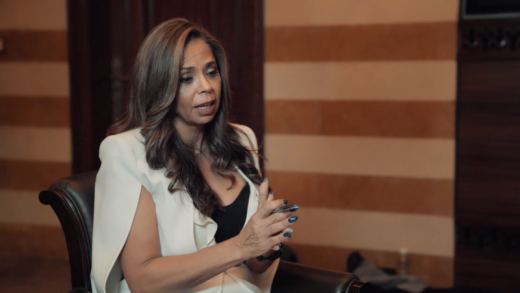
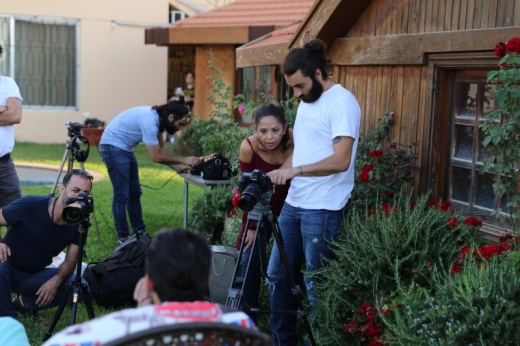

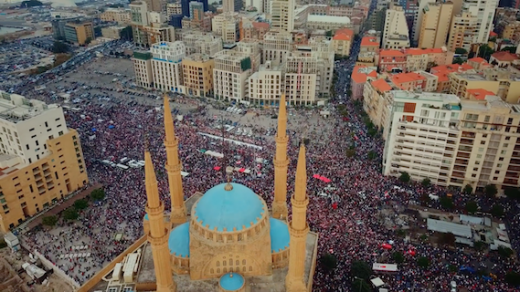
Interview by Vanessa McMahon. 74th Cannes Film Festival.



















